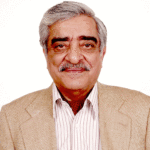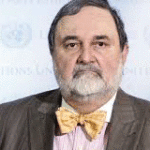The Big Question: Have Pakistan-US relations reached a dead-end? Can they be salvaged?
By Newsline Admin | Opinion | Published 7 years ago
Najmuddin Shaikh is a former foreign secretary and Pakistani ambassador to the US
 The brouhaha created by President Trump’s interview with Chris Wallace of Fox News was almost comical. Pursuing his objective of denigrating McRaven, the Head of the US Special Operation Forces, he recalled the derogatory reference to Pakistan in almost the same words as his January 2018 tweet. In doing what he did, President Trump displayed his ignorance of the talks his special envoy on Afghanistan, Zalmay Khalilzad, had conducted with the Taliban and of the many developments that had taken place in the region since his January tweet. The knee-jerk reaction of our political leaders suggested an almost equally embarrassing absence of analysis. There was, however, one redeeming feature of this sharp exchange. The American establishment made it clear that they wished to stay on track to improve relations with Pakistan, as was agreed to when US Secretary of State, Mike Pompeo, was in Pakistan and – at least by implication – that there had been no indication by Pakistan that cooperation was being curtailed.
The brouhaha created by President Trump’s interview with Chris Wallace of Fox News was almost comical. Pursuing his objective of denigrating McRaven, the Head of the US Special Operation Forces, he recalled the derogatory reference to Pakistan in almost the same words as his January 2018 tweet. In doing what he did, President Trump displayed his ignorance of the talks his special envoy on Afghanistan, Zalmay Khalilzad, had conducted with the Taliban and of the many developments that had taken place in the region since his January tweet. The knee-jerk reaction of our political leaders suggested an almost equally embarrassing absence of analysis. There was, however, one redeeming feature of this sharp exchange. The American establishment made it clear that they wished to stay on track to improve relations with Pakistan, as was agreed to when US Secretary of State, Mike Pompeo, was in Pakistan and – at least by implication – that there had been no indication by Pakistan that cooperation was being curtailed.
After two rounds of intense negotiations with the Taliban team – the lasted over three days – Zalmay Khalilzad has publicly expressed the hope that the Taliban and Afghan government representatives will start negotiations by April next year. The Taliban delegation was bolstered by the presence of two former Guantanamo prisoners released into Qatar’s custody. Pakistan, it was acknowledged, had contributed to the process by releasing – at Khalilzad’s urging – Ghani Baradar, a Co-Founder of the Taliban, Salahuddin, a military commander from the Khost province, and more recently, Samad Sani, a former military commander from Kandahar. Baradar was Mulla Omar’s principal deputy, while the two military commanders were in the field until three years ago and may still wield influence over members of the Taliban engaged in combat.
Khalilzad was criticised by the Taliban for saying that the organisation had acknowledged its inability to secure a military victory, but this was only to be expected.
At the Moscow meeting, Pakistan claimed that it had first initiated and then advocated universal acceptance of the proposition that “reconciliation” had to be “Afghan-owned and Afghan-led” and expressed satisfaction that things were moving forward. This was followed by an announcement in Islamabad that Pakistan supported the continued presence of the US in Afghanistan until a durable peace was established. It was a belated recognition of the fact that Afghanistan, without the $4.1 billion annual funding from the US and its allies, could not pay its defence forces for even two months and that more than 55 per cent of its budget, covering health, education and social services, was met using foreign aid.
These moves by Pakistan all portend greater and more concrete support in the quest for reconciliation on acceptable terms and, in return, a reversion to the closer ties that Pompeo and, more recently, Alice Wells, spoke of.
I anticipate a muting, in Pakistan, of anti-American rhetoric and more encouraging noises on America’s part about helping Pakistan resolve its financial crisis.
In other words, a transactional relationship better designed to be mutually beneficial, and one that recognises that de-hyphenation of US relations with countries in South Asia, will be the US policy for some time to come.
Zahid Hussain is a journalist and author of The Scorpion’s Tale and Frontline Pakistan.
 Often described as a ‘shotgun marriage’ solemnised in the aftermath of 9/11, the alliance between Washington and Islamabad seems to have come full circle. Donald Trump’s latest tirade against Pakistan is yet another reminder of a relationship getting uglier. It was not the first time that the president launched an outrageous broadside. In his New Year tweet he had accused Pakistan of lying and being deceitful. Furthermore, his South Asia policy has brought Pakistan-US ties to a new low.
Often described as a ‘shotgun marriage’ solemnised in the aftermath of 9/11, the alliance between Washington and Islamabad seems to have come full circle. Donald Trump’s latest tirade against Pakistan is yet another reminder of a relationship getting uglier. It was not the first time that the president launched an outrageous broadside. In his New Year tweet he had accused Pakistan of lying and being deceitful. Furthermore, his South Asia policy has brought Pakistan-US ties to a new low.
The current state of US-Pakistan relations is even worse than what it was in the 1990s, when Pakistan was under all kinds of US sanctions. The antagonism and hostility being witnessed currently is unprecedented. Washington’s demand for unquestionable compliance is unacceptable to Pakistan. Trump’s policy of using pressure tactics to bring Pakistan to its knees does not seem to be working.
Almost all US military aid has been stopped and only a trickle of civilian aid is now coming to Pakistan. The interaction between the two countries has been reduced to a low-official level, though military-to-military contacts may still have survived. While the illusion of any strategic convergence has been absent for long, even a transactional relationship is hard to maintain. Like previous American presidencies, the Trump administration is also seeing relations with Pakistan from a purely Afghan prism.
It is not just the Afghan issue straining relations between Washington and Islamabad. The Trump administration has also expressed its concern over Pakistan’s growing strategic and economic ties with China. Officials regularly question Beijing’s strategic stakes in CPEC. The recent warning by US officials against any IMF bailout for Pakistan that would help the latter pay off its Chinese debt, indicates that Washington is willing to go to any extent to stifle Pakistan financially, as part of its pressure tactics.
Yet a complete breakup is not a choice for either side – at least for now. Notwithstanding these tensions, there is still some convergence of interest between the two estranged allies when it comes to ending the war in Afghanistan. But the Trump administration’s tactics will not help the two sides work together. Managing these troubled ties will also pose a serious challenge to the new Pakistani government.
Huma Yusuf is a columnist for Dawn and a Global Fellow of the Woodrow Wilson International Center for Scholars.
 It used to be the fulcrum of our foreign policy. Now it is a relationship conducted through Twitter tirades. Pakistan-US ties continue to drag along at a low point since US President Donald Trump’s New Year tweets accusing Pakistan of ‘lies and deceit.’ Last month, he complained on Fox News that Pakistan has not done a “damn thing” for the US.
It used to be the fulcrum of our foreign policy. Now it is a relationship conducted through Twitter tirades. Pakistan-US ties continue to drag along at a low point since US President Donald Trump’s New Year tweets accusing Pakistan of ‘lies and deceit.’ Last month, he complained on Fox News that Pakistan has not done a “damn thing” for the US.
Nationalists will point to Trump’s ravings and his decision to cut military and civilian aid, compare the US’s behaviour with Chinese largesse and Saudi bounty, and call for Pakistan to sever ties with the US once and for all. But this is not the time to walk away from Washington.
Post-2001, the two countries spent a decade trying to forge a close relationship despite having divergent strategic priorities. Since 2011, they have gradually, painfully, acknowledged the divergence, and that ties were transactional even at their best. But now they finally agree on something – the need for political reconciliation to end the Afghan conflict – and so should work harder to get along.
Washington and Islamabad are both invested in seeing a negotiated settlement to the conflict in Afghanistan. The means to this end may still not line up – the US wants Pakistan to ‘deliver’ an amenable Taliban to the National Unity Government in Kabul; Pakistan wants to facilitate Taliban-US talks – but alignment is what diplomacy strives for, and it’s easier achieved with a shared goal. Cooperating on Afghanistan would also create opportunities to revive other aspects of the bilateral relationship.
Islamabad (and Aabpara) need to make the effort because, as much as this hurts to hear, they cannot afford to make an enemy of Washington. US lobbying efforts to place Pakistan on the FATF grey list, and its leverage over the IMF, are examples of ways in which the US can wield its influence to Pakistan’s detriment, and in ways that even the strongest regional ties cannot mitigate. Pakistan still stands to gain much from the US in terms of trade and investment, knowledge and technology transfer, support for human rights, democracy and other advocacy, and, of course, strategic cooperation on security matters.
The US will not make it easy for Pakistan to work with it over the coming months, a particularly crucial period in the run-up to the Afghan presidential elections. The current US administration is chaotic, inconsistent and seemingly incapable of diplomatic engagement. Just in recent weeks, Trump’s inflammatory Fox News interview on November 18 was followed by conciliatory words from the US State Department on November 23, with calls for the countries to collaborate in the fight against terrorism, and praise for Pakistani first responders. Then, on November 26, the tenth anniversary of the Mumbai attacks, the US again put pressure on Pakistan to take action against Lashkar-e-Taiba.
But as the party with more to lose – both in terms of enduring the fallout of the proximate Afghan conflict, and on the international stage as a country in the US’s crosshairs – Pakistan will have to find a way to engage. Coordinating a military and civilian strategy articulating both Pakistan’s role in the Afghan reconciliation process, and a way to communicate this to the US, may well be the country’s greatest foreign policy challenge for the coming year.
Hussain Haroon is a former permanent representative of Pakistan at the United Nations.
 For a long period of time, I have been cautioning the government of Pakistan against the widespread propaganda of our neighbours, who continually seek to undermine our standing in the international community.
For a long period of time, I have been cautioning the government of Pakistan against the widespread propaganda of our neighbours, who continually seek to undermine our standing in the international community.
The US Department of State, from the tenor of former president Barack Obama, has been ignoring the realities of Pakistan and finger-pointing in what appears to be an outright attempt to create a false image of its intentions towards the US government and the American people.
The advent of President Donald Trump has only exacerbated these troubles, mainly because we have not been able to protect our own interests and identity, even when we have kowtowed to the US government. The US keeps on trying to make us the scapegoats. This attitude has, in no small way, been fuelled by our relationship with China and the traditional geo-political complexities and rivalries of the subcontinent.
I recall a conversation I had with an American officer and his Iranian wife, Mrs. Hoffman, in Iran in 1968, and was appalled to discover the breakdown in Iran-US relations. I remember Mrs Hoffman saying to me that the moment you allow the US to proceed from being friends to being benefactors, the country feels the need to control these so-called friends. If the Americans do not achieve their objective, which involves going from friendship to ‘controller,’ they do not hesitate to change the country’s government – even if it means breaking up the country.
Pakistan has let itself down. We have forgotten how to survive and our ‘western-educated’ classes look to the West as their Mecca. Our dependency has converted us into a nation of beggars and our weak response continues to draw a trail of hopelessness.
We are not, however, at a dead-end in our relationship with America. Compared to the 20 per cent of African countries believed to be the poorest in the world, we are like the Puerto Ricans now, who are owned by the Americans but have a 100-to-1 disadvantage to American citizens. The US State Department believes that if it blows hard, Pakistan will disappear. In fact, the US is helping lay the groundwork for the future disaster of Pakistan – through their policies and actions, scripted by the government of India.
Whether it was the nuclear tests conducted by the Indian Army in Pokhran (Jaisalmer district), or the special concessions recently accorded to India in its purchase of oil from Iran (despite American sanctions), the US government’s treatment of Pakistan has been very unfair in comparison to that of its neighbour. Pakistan continues to teeter on the edge of an abyss, waiting for the coup de grace by our former allies and Nato friends.
We continue to die by a thousand cuts. When will we respect our founding fathers and behave like a nation?


